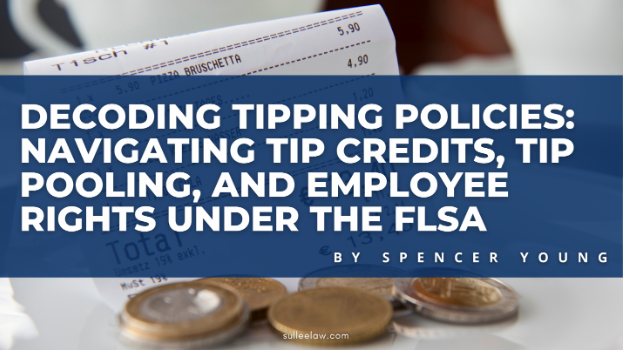Under the FLSA, an employer may take a tip credit towards its minimum wage and overtime obligations. Any employer claiming a tip credit must ensure the employees receive enough tips from customers, and direct wages per workweek to equal at least the minimum wage and overtime compensation required under the FLSA. Under the FLSA, a tipped employee must be paid at least $2.13 an hour. An employer can take an FLSA tip credit equal to the difference between the direct wage, or the cash wage it pays directly to the tipped employee, and the federal minimum wage. The maximum tip credit that an employer can currently claim is $5.12 per hour: ($7.25 – $2.13direct (or cash) wage = $5.12). Only tips actually received by the employee count when determining whether the employee is a tipped employee and in applying the tip credit. If an employee’s weekly earnings do not equal the minimum hourly wage of $7.25, the employer must make up the difference.
When tips are charged on customers’ credit cards and the employer can show that it pays the credit card company a percentage on such sales as a fee for payment using a credit card, the employer may pay the employee the tip, less that percentage. An employer cannot reduce the amount of tips paid to the employee by any amount greater than the transactional fee charged by the credit card company, regardless of whether or not it takes a tip credit. Additionally, this transactional fee may not reduce the employee’s wage below the required minimum wage, including the amount of any tip credit claimed.
A compulsory charge for service, for example, 15 percent of the bill, is not considered a tip under the FLSA. Sums distributed to employees from service charges are not tips but may be used to satisfy the employer’s minimum wage and overtime pay obligations under the FLSA.
- Tip Pooling
Under the FLSA, an employer may “pool” the tips accumulated by eligible employees. Tip pooling is a practice in the hospitality industry where tipped employees contribute the tips they’ve earned into a pool at the end of a shift. That pool is then divided (often equally, but not always) among a designated group of employees. There is not limit on the percentage of the contribution of each employee in valid mandatory tip pools. The applicable rules are contingent on whether the employer pays a direct wage equating to minimum or not:
- Traditional Tip Pooling
A mandatory tip pooling must be available only to those employees in occupations in which they customarily and regularly receive tips, such as waiters, bellhops, counter personnel (who serve customers), bussers, and service bartenders. Managers and supervisors are unable to receive tips from such an arrangement. An employer that using this type of tip pooling:
- must notify tipped employees of any required tip pool contribution amount;
- may only take a tip credit for tips each tipped employee ultimately receives; and
- may only take a tip credit for tips each eligible employee ultimately receives, and may not retain any of the employee’s tips.
- Direct Wage Tip Pooling
When an employee is paid a cash wage of at least the federal minimum wage, the employer may impose a mandatory tip pooling arrangement that includes employees who are not employed in an occupation in which employees customarily and regularly receive tips. If the amount of tips received or how they should be distributed cannot be determined before processing payroll, the tips must be misattributed as soon as practically possible thereafter.
- Employers may not keep Tips
Regardless of whether an employer takes a tip credit, the FLSA prohibits employers from keeping any portion of employees’ tips for any purpose, whether directly or through a tip pool (even when the tipped employee receives federal minimum wage).
Managers and supervisors include any employee:
- whose primary duty is managing the business;
- who customarily and regularly directs the work of at least two or more other full-time employees; and
- who has the authority to hire or fire other employees, or whose suggestions and recommendations as to the hiring or firing are given particular weight.
Business owners who own at least a bona fide 20 % equity interest in the enterprise in which they are employed and who are actively engaged in its management are also managers and supervisors who may not keep employees’ tips.
A manager or supervisor may keep only those tips that they receive directly from a customer for the service they directly and solely provide. For example, a restaurant manager who serves their own tables may keep their own tips from customers they served but would not be able to receive other employees’ tips by participating in a tip pool.
- Notice to Employees
Employers must provide the following information to tipped employees, whether done orally or in writing, before taking a tip credit under the FLSA:
- the amount of the direct (or cash) wage the employer is paying a tipped employee, which must be at least $2.13 per hour;
- the additional amount claimed by the employer as a tip credit, which cannot exceed $5.12 (the difference between the minimum required direct (or cash) wage of $2.13 and the current minimum wage of $7.25);
- that the tip credit claimed by the employer cannot exceed the amount of tips actually received by the tipped employee;
- that all tips received by the tipped employee are to be retained by the employee except for a valid tip pooling arrangement limited to employees who customarily and regularly receive tips; and
- that the tip credit will not apply to any tipped employee unless the employee has been informed of these tip credit provisions.

